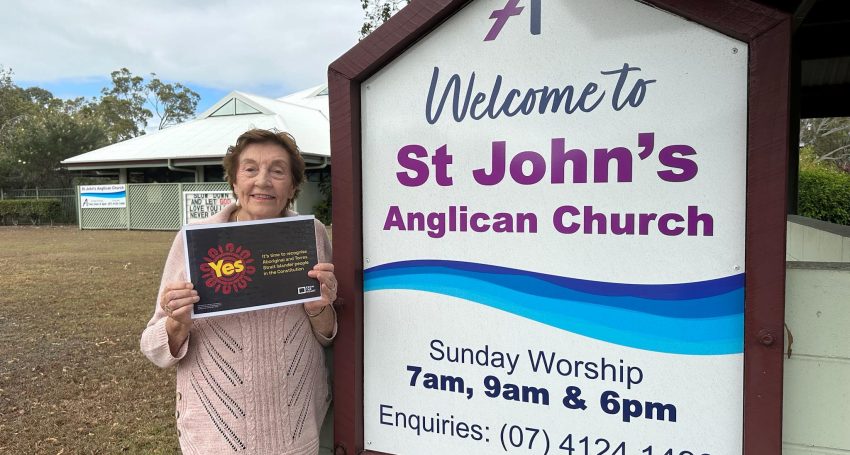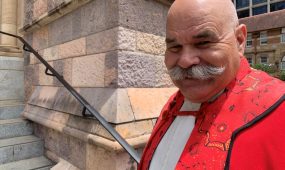Why I am voting “yes" in the referendum: Jill Rylatt
Justice & Advocacy
“In my experience, the best way to find out what’s working and what’s not is to ask the people who are receiving the services. The Voice will be an advisory body, and when it’s up and running Aboriginal and Torres Strait Islander community members from the grassroots will be able to communicate via a direct avenue to Parliament about why ‘the gap’ isn’t closing and how best to close it,” says former nurse Jill Rylatt from St John’s, Hervey Bay

Story Timeline
Why I am voting “yes” in the referendum
- Why I support constitutional recognition through an Aboriginal and Torres Strait Islander Voice to Parliament: Aunty Dr Rose Elu
- Why I am voting “yes” in the referendum: Sue Cooke
- Why I am voting “yes” in the referendum: The Ven. Geoff Hoyte
- Why I am voting “yes” in the referendum: Phyllis Marsh
- Why I am voting “yes” in the referendum: Bishop Daniel Abot
- Why I am voting “yes” in the referendum: Adrian Malone
- Why I am voting “yes” in the referendum: The Rev’d Cameron Freese
- Why I am voting “yes” in the referendum: The Rev’d Rick Gummow
- Why I am voting “yes” in the referendum: Uncle Milton Walit
- Why I am voting “yes” in the referendum: Marilyn Wright
- Why I am voting “yes” in the referendum: Barry Kuskopf
- Why I am voting “yes” in the referendum: Aiden Wu
- Why I am voting “yes” in the referendum: Reg Dean
As a young trainee nurse in the 1950s in Melbourne I remember nursing Aboriginal children who had trachoma, which is a serious eye disease. Trachoma is caused by a bacteria that is spread by lack of access to clean water and sanitation, and is a leading cause of blindness in the world’s poorest countries.
While Trachoma is treatable and preventable, The Fred Hollows Foundation says that Australia remains the only developed country where it still exists in endemic proportions, which places us on a list alongside nations such as the Democratic Republic of Congo and Afghanistan. Tragically, this is because Trachoma still disproportionately impacts Indigenous Australians.
Advertisement
While there haven’t been cases of trachoma in “mainstream Australian” for over 100 years, Aboriginal and Torres Islander peoples are still impacted, especially young children in rural northern and central Australia.
As a former nurse and knowing what I know, I often think about the health and life expectancy gap between Indigenous and non-Indigenous Australians. However, when I talk to friends, family and people from church about this, I realise that most people don’t know. Generation after generation of people don’t know — they just go along oblivious to this situation and others like it, largely because they haven’t seen it first hand like I have.
My overwhelming personal feeling is that recognising Aboriginal and Torres Strait Islander peoples in the Constitution through an independent advisory body like the Voice is the morally right thing to do. In my experience, the best way to find out what’s working and what’s not is to ask the people who are receiving the services. The Voice will be an advisory body, and when it’s up and running Aboriginal and Torres Strait Islander community members from the grassroots will be able to communicate via a direct avenue to Parliament about why “the gap” isn’t closing and how best to close it.
Advertisement
I recently read a factual booklet that was supplied during a church presentation. The booklet clearly focused on what the actual constitutional wording will be, and it makes sense.
Then late last week I saw on the television news Australia’s former chief justice Robert French saying that the Voice is constitutionally sound because the Voice’s “ultimate form and functions will be in the hands of the elected parliament”. The booklet makes this clear because the last line of the proposed constitutional wording says that: “the Parliament shall, subject to this Constitution, have power to make laws with respect to matters relating to the Aboriginal and Torres Strait Islander Voice, including its composition, functions, powers and procedures.”
Robert French also explained that the Voice to Parliament and the Executive Government will “provide an opportunity for coordinated, national advice from a First Peoples’ body”.
So I think it’s morally right and common sense that the first inhabitants of this land should be formally acknowledged in our Constitution through the Voice.
Editor’s note: This anglican focus feature, written by The Ven. Geoff Hoyte, The Rev’d Michael Stalley and The Rev’d Rick Gummow, provides a timeline showing how the ACSQ came to its position on recognising Aboriginal and Torres Strait Islander peoples in the Constitution through a Voice to Parliament.





